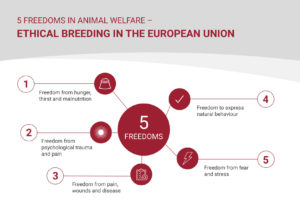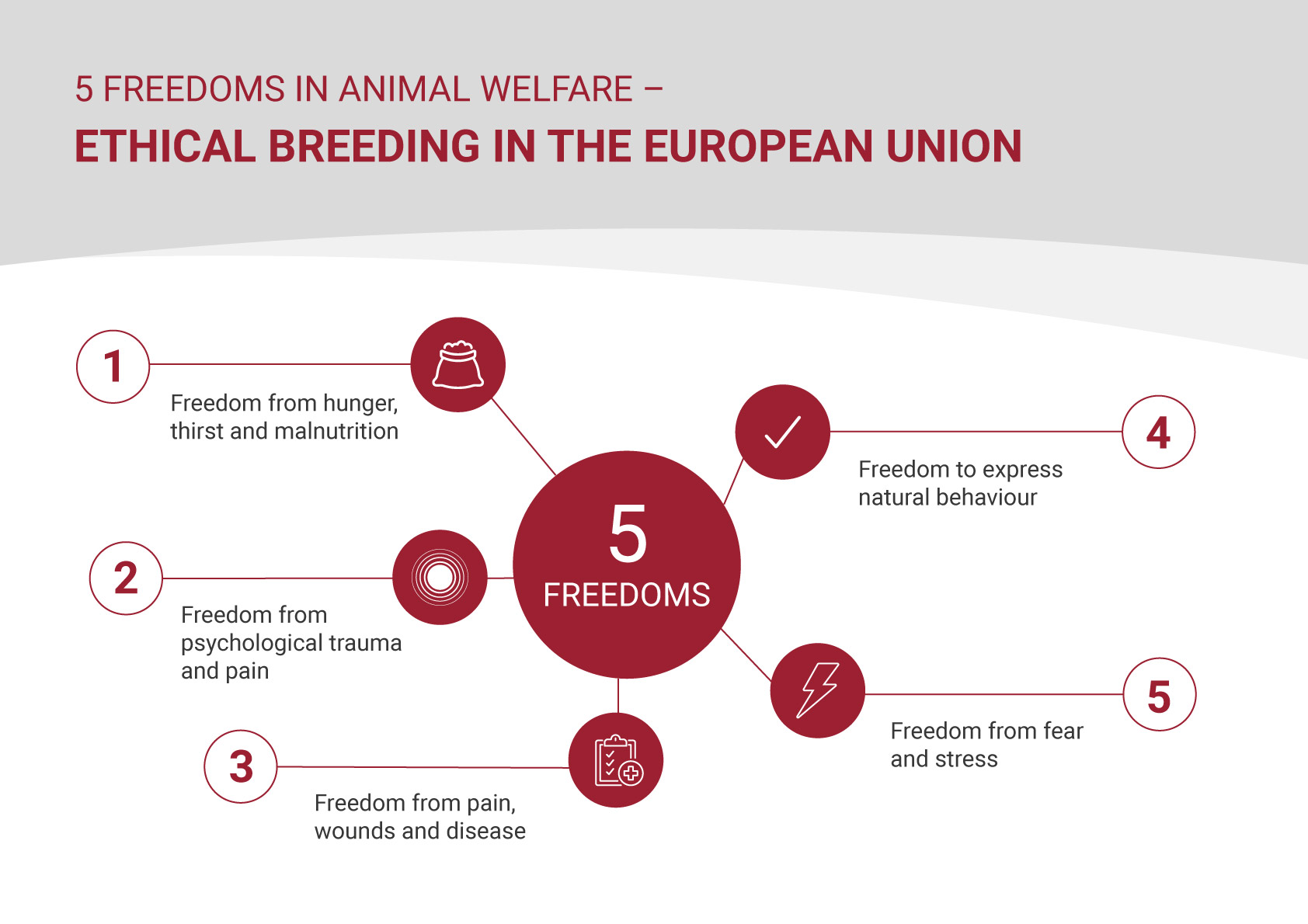The European Union member states are pioneers in animal welfare and ethical agricultural production. Several hundred years of animal protection efforts have resulted in the development of five key livestock freedoms, often referred to as the five freedoms. Planned actions confirm that in the near future the Union will continue to be a leader in setting standards for ethical animal husbandry. It is worth knowing how European livestock farmers are progressing in this area – after all, according to research, as many as 89% of Americans are concerned about the situation of livestock production in their country[1].
Already in 1974, the European Union states were taking innovative actions in the area of animal rights, but the real change was Council Directive 98/58/EC of 20 July 1998 concerning the protection of animals kept for farming purposes. European Union legislation on animal welfare reflects the five freedoms[2]:
- Freedom from hunger, thirst and malnutrition – providing fresh water and nutritious food to ensure animals have adequate health and vigour;
- Freedom from psychological trauma and pain – providing adequate infrastructure for keeping animals;
- Freedom from pain, wounds and disease – regular veterinary checks, prevention and treatment of disease;
- Freedom to express natural behaviour – providing adequate space to express normal behaviour, ensuring appropriate companionship with other animals;
- Freedom from fear and stress – appropriate level of care and treatment, proper training of staff and reduction of mental and physical suffering of animals[3].
The five freedoms of livestock are the basis for understanding animal welfare and the protection of animal rights in the European Union, strongly reflected in the principle of cross-compliance. Every farmer in the Union must meet the same strict requirements to ensure proper housing and treatment of livestock[4]. These requirements transform noble ideas into effective legal solutions. Individual freedoms are guaranteed with the following tools:
- Freedom from hunger, thirst and malnutrition – under cross compliance European farmers are obliged to use only the feed that is safe for the animals[5] and to install adequate infrastructure for feeding and watering the animals under hygienic and safe conditions[6],
- Freedom from trauma and pain – producers have a duty to provide a safe environment – for example, floors that allow moving without injury and limit limb damage as much as possible, crates that eliminate the possibility of injury or conflict within the herd[7],
- Freedom from pain, injury and disease – each animal must receive professional veterinary care, and in the case of sick or injured animals, intervention must be immediate. Any treatment, such as dosing antibiotics or teeth grinding, should only be carried out by experienced and trained persons,
- Freedom to express natural behaviour – livestock must be provided with living space whose size depends on the animal specie and the production system – this space should allow freedom of movement and expression of normal behaviour[8]. Animals must also have visual contact with other animals,
- Freedom from fear and stress – farmers are obliged to look after their animals on a daily basis and to reduce their stress. There are also a number of good practices to reduce these negative states with appropriate toys and accessories[9].
The European Union has been active in protecting animal rights for more than 40 years – making the EU’s animal welfare standards one of the best in the world[10]. The concept of the five freedoms is constantly evolving, with more and more welfare systems being set up in the Union to raise animal welfare standards. It can be expected that new developments linked to the European Green Deal will introduce a range of voluntary practices to set a new, higher level of concern for ethical animal production in the European Union[11].

- [1] https://www.aspca.org/shopwithyourheart/business-and-farmer-resources/aspca-surveys
- [2] https://eur-lex.europa.eu/legal-content/PL/TXT/?uri=CELEX:31998L0058
- [3] https://www.europarl.europa.eu/news/pl/headlines/society/20200624STO81911/dobrostan-i-ochrona-zwierzat-przeglad-przepisow-ue-wideo
- [4] https://op.europa.eu/webpub/eca/special-reports/animal-welfare-31-2018/en/
- [5] CROSS-COMPLIANCE INFORMATIONAL MATERIAL (cross-compliance), Ministry of Agriculture and Rural Development, Warsaw, February 2018.
- [6] http://isap.sejm.gov.pl/isap.nsf/download.xsp/WDU20100560344/O/D20100344.pdf
- [7] http://isap.sejm.gov.pl/isap.nsf/download.xsp/WDU20100560344/O/D20100344.pdf
- [8] http://witrynawiejska.org.pl/zwierzeta/item/20652-lamanie-praw-zwierzat-na-wsi
- [9] https://www.eca.europa.eu/Lists/ECADocuments/SR18_31/SR_ANIMAL_WELFARE_EN.pdf
- [10] https://www.europarl.europa.eu/news/pl/headlines/society/20200624STO81911/dobrostan-i-ochrona-zwierzat-przeglad-przepisow-ue-wideo
- [11] https://op.europa.eu/webpub/eca/special-reports/animal-welfare-31-2018/en/
